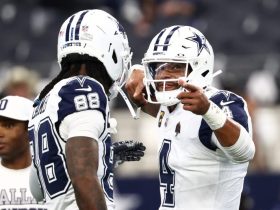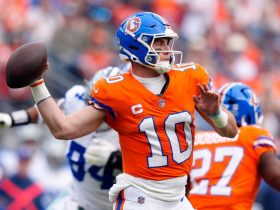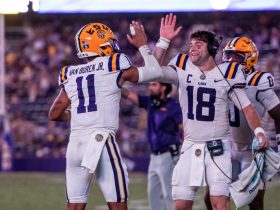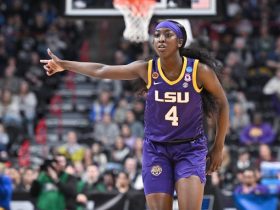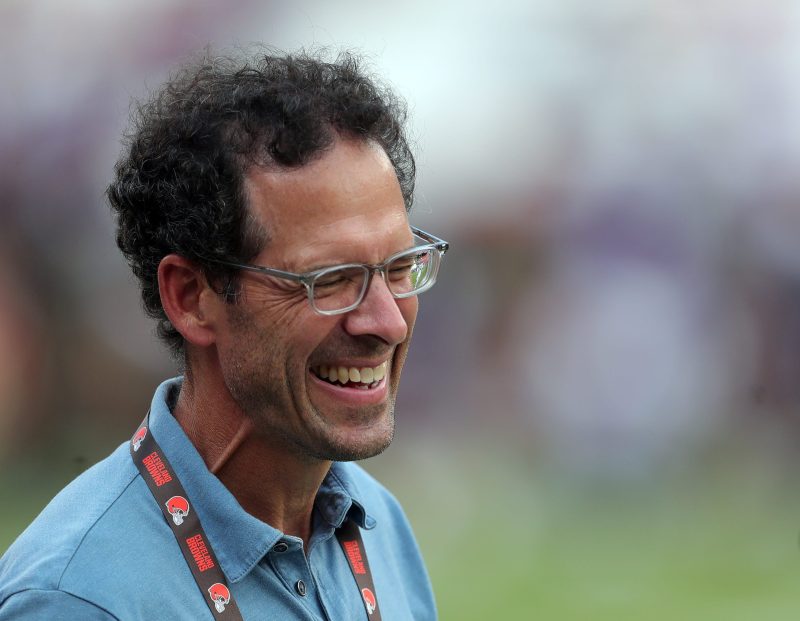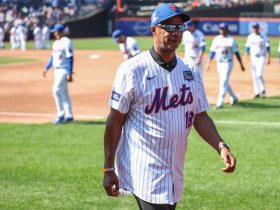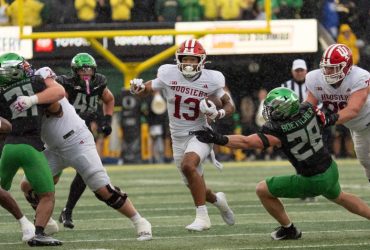LAS VEGAS — The shock is starting to wear off, but the disbelief was still permeating The Cosmopolitan of Las Vegas hotel Tuesday night like cigarette smoke hovering in the air at the craps games and poker tables.
There he was, 10 years after he last set foot at the Major League Baseball General Manager meetings, in a room with peers having heard of him, but precious few knowing him.
Paul DePodesta, who spent the last 10 years with the NFL’s Cleveland Browns, was holding court with the national media for the first time, with everyone having the same question:
What in the world is he doing here as the new president of baseball operations for the Colorado Rockies?
There wasn’t a single GM who called DePodesta’s hire an “insult,’’ like former manager Joe Maddon said about the San Francisco Giants’ hiring of college coach Tony Vitello to be their manager, but still, no one had an answer.
Hiring DePodesta, 52, isn’t like hiring a reliever who retired two years ago to manage, like in San Diego, or a 33-year-old getting a managerial job in Washington. He had 20 years of MLB experience and was once the GM of the Los Angeles Dodgers.
Still, when you’re away from the game for a decade and are wearing a headset and studying a clipboard on Sundays, folks are curious.
“I can’t wait to talk to him,’’ said Alex Anthopoulos, Atlanta’s president of baseball operations. “I’d love to hear about his experience in the NFL.’’
The only National League GMs even around when DePodesta departed the New York Mets for the NFL were A.J. Preller of the San Diego Padres and Andrew Friedman of the Los Angeles Dodgers.
No one believed they’d ever see DePodesta in baseball again.
Besides, when the Browns go 56-99-1 under your watch as the Browns’ Chief Strategy Officer, and you’re directly involved in the disastrous Deshaun Watson trade – sending three first-round picks and giving Watson a five-year, $230 million contract – a whole lot of folks tend to lose your number.
Well, not the Rockies – with former Rockies GM Dan O’Dowd running interference – who selected DePodesta after Arizona Diamondbacks assistant GM Amiel Sawdaye was offered the job, and rejected it, because of family reasons.
Now, here DePodesta is, after failing to obtain the next Holy Grail of sports and lead the Browns to their first Super Bowl championship, he’s trying to get the Rockies their first World Series title.
“I’m rooting for both,’’ DePodesta says. “I’ll actually take them in either order, as long as they both happen pretty quickly…’
What would be the biggest miracle?
“I don’t know if I’ll ever see that day, but I hope it’s the Browns,’’ said Peter Bendix, the Marlins’ president of baseball operations and a Cleveland native. “I’m just very happy for him. When I first got this job (two years) ago, Paul didn’t know me, but he was extremely supportive. He gave me calls, texts, and said, ‘Let me know if I can be helpful.’ And he meant it. He had no reason to be that way and he was. That’s just who he is as a person.’’
Certainly, DePodesta needs all of the help he can get considering he’s taking over a team that lost an MLB-worst 119 games last year, lost 100 or more games three consecutive years, finished last or next-to-last seven consecutive seasons, and has never won the NL West in the franchise’s 33-year history.
And you thought that the Browns, with three winning seasons since 2002, have their troubles?
“I’m a sucker for a challenge,’ DePodesta said.
He’s at the base of Mount Everest wearing flip-flops trying to get the Rockies to even a playoff berth in the monstrous NL West.
So really, why come back?
He received a few calls in the first five years of his departure from baseball, but said there never was a compelling reason for him to walk away from the Browns. He was ecstatic in 2020 that he was responsible for helping hire a new GM and new head coach, and received a five-year extension. It was only the last few years where he felt the itch of returning to baseball one last time.
“It wasn’t a situation where I was like, looking to leave by any stretch,’’ DePodesta said, “but over the last couple of years I had thought about at least the possibility of coming back, you know, what might be next. But it really would have to be sort of the right situation. That right situation includes challenge.’’
Certainly, it helped that the Rockies had several folks like O’Dowd, Sandy Alderson and Billy Beane lobbying for him. He spent years in the NL West working for the Padres and the Dodgers. And he lived in La Jolla, California, and was willing to move to Denver.
Now, he has the burden of trying to get back up to speed in a game that’s dramatically changed the last 10 years. Batting average is out, OPS is in. Strikeouts are accepted, home runs are awesome. Launch angle and exit velocity are the new talk, while complete games and .300 hitters are obsolete.
“I was always trying to keep abreast of what was happening in baseball,’’ DePodesta said, “maybe not to the extent that I was when I was working full-time, but I was still interested in everything that was going on.’’
Now, he’s responsible for taking a pitching staff that yielded an MLB-worst 6.65 ERA, a lineup filled with kids, and a $182 million albatross in Kris Bryant, and expected to miraculously compete with the Dodgers.
Watson may win the Walter Payton Man of the Year award before the Rockies ever topple the Dodgers.
The Rockies aren’t going to ever out-spend the Dodgers. They aren’t ever going to have more talent than the Dodgers. But, hey, when you spend a decade with the Browns, you get a few ideas.
“I’ll say this, I’m very willing to experiment right now and try different things,’’ DePodesta said. “I don’t have all of the answers by any stretch. But I’m pretty relentless when it comes to trying to find them. …
“We have to be willing to try some different things.’’
He will canvass the thoughts of all those that went before him, those that are still in the organization, those that have been fired and run over, and plans to make it a shared vision.
Some ideas will work, some will blow up in their face, and some will be catastrophic, whether it was the Bryant signing or the Watson trade.
“Most decisions when it comes to significant player decisions…’’ DePodesta says, trying to explain the Watson trade, “I consider those to be organizational decisions. So anyone who is within the sort of senior leadership group, we all own those decisions. Every one of them. …
“There’s a lot we can’t share publicly, but there was an incredible amount of diligence that goes into every one of our decisions over the last 10 years, and ultimately, we got to the place where we did.’’
DePodesta insists he’s in this for the long haul. There were plenty of Sunday nights when he wished he had stayed in baseball, but never did he feel like quitting, or feel that he made a mistake. He’s taking the same approach now.
“I purposely went back to the learning curve,’’ he said. “What was really hard at the beginning was I went from 20 years in baseball where you’re not necessarily great at what you do, I’d been through the cycle enough where I felt confident.
“And then to go to the NFL where I felt decidedly incompetent, and that was going to last for awhile. That was hard to get through. But at no point (did) I want to bail on that and say, ‘Oh, I should just go back to where I’m comfortable.’ No, this is sort of the growth and challenge I was looking for.’’
Now, here he is again, 10 years later. There will be plenty of cool nights in the Rocky Mountains where he’ll feel incompetent again, wonder if he made the wrong decision returning to baseball … and realize every day that this may be the greatest challenge he’ll ever encounter in his life.
Time will tell whether he made the right decision.
And time will tell whether the Rockies will regret hiring him.
Buckle up, this should be one turbulent ride.
Follow Nightengale on X: @BNightengale

